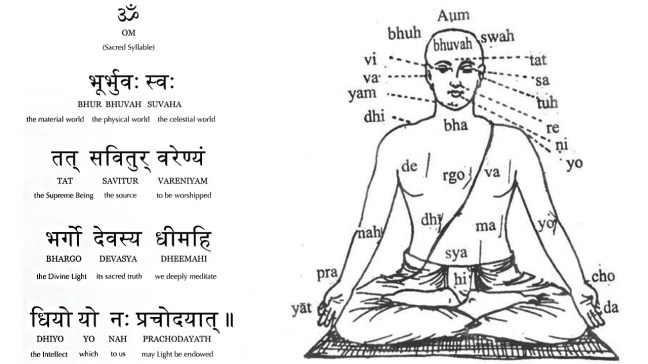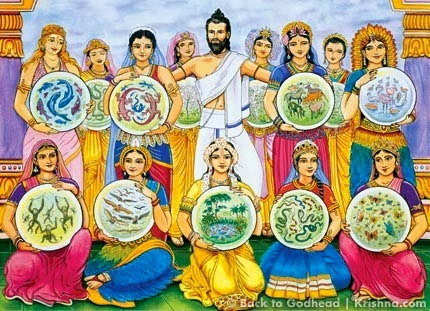SOME PROMINENT HOLY PLACES OF BHARATAVARSHA
 Suta said---'There are seven prominent mountain ranges in Bharatavarsha--Mahendra, Malay, Sahya, Shaktiman, Rikshavan, Vindhya and Pariyatra. Some prominent rivers supplying potable water to the inhabitants of Bharatavarsha are---Ganga, Sindhu, Saraswati, Godwari, Narmada, Shatadru, Yamuna, Vipasha, Mahanadi, Vidisham, Varuna etc. The names of the main Janapadas situated in the northern part of Bharatavarsha are Kuru, Panchal, Shalva, Matreya, Jangal, Shoorsen, Pulind, Baudh, Chedi, Matsya, Bhoj, Sindhu, Utkal, Koshal, Madra, Kalinga, Kashi, Malav, Magadh, Videh, Anga, Banga, Surashtra, Kekay, Kashmir and Gandhar. Similarly, Janpadas like Dravid, Keral. Prachya, Karnatak, Kuntal, Chol, Sauhrid, Kona, Korak, Kalad, Mushal and Sutap are situated in the southern part of Bharatavarsha.
Suta said---'There are seven prominent mountain ranges in Bharatavarsha--Mahendra, Malay, Sahya, Shaktiman, Rikshavan, Vindhya and Pariyatra. Some prominent rivers supplying potable water to the inhabitants of Bharatavarsha are---Ganga, Sindhu, Saraswati, Godwari, Narmada, Shatadru, Yamuna, Vipasha, Mahanadi, Vidisham, Varuna etc. The names of the main Janapadas situated in the northern part of Bharatavarsha are Kuru, Panchal, Shalva, Matreya, Jangal, Shoorsen, Pulind, Baudh, Chedi, Matsya, Bhoj, Sindhu, Utkal, Koshal, Madra, Kalinga, Kashi, Malav, Magadh, Videh, Anga, Banga, Surashtra, Kekay, Kashmir and Gandhar. Similarly, Janpadas like Dravid, Keral. Prachya, Karnatak, Kuntal, Chol, Sauhrid, Kona, Korak, Kalad, Mushal and Sutap are situated in the southern part of Bharatavarsha.
Once, sages requested Suta to describe about the most prominent places of pilgrimage situated in Bharatavarsha. Suta commenced his narration by describing the origin of creation and then switched over to the geographical characteristics of Bharatavarsha.
 Suta said---'There are seven prominent mountain ranges in Bharatavarsha--Mahendra, Malay, Sahya, Shaktiman, Rikshavan, Vindhya and Pariyatra. Some prominent rivers supplying potable water to the inhabitants of Bharatavarsha are---Ganga, Sindhu, Saraswati, Godwari, Narmada, Shatadru, Yamuna, Vipasha, Mahanadi, Vidisham, Varuna etc. The names of the main Janapadas situated in the northern part of Bharatavarsha are Kuru, Panchal, Shalva, Matreya, Jangal, Shoorsen, Pulind, Baudh, Chedi, Matsya, Bhoj, Sindhu, Utkal, Koshal, Madra, Kalinga, Kashi, Malav, Magadh, Videh, Anga, Banga, Surashtra, Kekay, Kashmir and Gandhar. Similarly, Janpadas like Dravid, Keral. Prachya, Karnatak, Kuntal, Chol, Sauhrid, Kona, Korak, Kalad, Mushal and Sutap are situated in the southern part of Bharatavarsha.
Suta said---'There are seven prominent mountain ranges in Bharatavarsha--Mahendra, Malay, Sahya, Shaktiman, Rikshavan, Vindhya and Pariyatra. Some prominent rivers supplying potable water to the inhabitants of Bharatavarsha are---Ganga, Sindhu, Saraswati, Godwari, Narmada, Shatadru, Yamuna, Vipasha, Mahanadi, Vidisham, Varuna etc. The names of the main Janapadas situated in the northern part of Bharatavarsha are Kuru, Panchal, Shalva, Matreya, Jangal, Shoorsen, Pulind, Baudh, Chedi, Matsya, Bhoj, Sindhu, Utkal, Koshal, Madra, Kalinga, Kashi, Malav, Magadh, Videh, Anga, Banga, Surashtra, Kekay, Kashmir and Gandhar. Similarly, Janpadas like Dravid, Keral. Prachya, Karnatak, Kuntal, Chol, Sauhrid, Kona, Korak, Kalad, Mushal and Sutap are situated in the southern part of Bharatavarsha.
Suta then described about the greatness of Pushkar tirth by recounting an incident related with the Pandavas---
"One day, Sage Narada visited the Pandavas who were living in exile. The Pandavas had visited many places during the course of their exile period and wanted to know about the fruits they had acquired due to their pilgrimage.
"Sage Narada then recounted an incident when king Dilip had once posed the same question to Sage Vashishtha. Sage Vashishtha while describing about the greatness of Pushkar said---Pushkar tirth is the holiest place where lord Brahma has his abode. Deities consider themselves fortunate to be at Pushkar. A person who takes a holy dip at Pushkar and worships lord Brahma acquires virtues equivalent to the accomplishment of the Ashwamedha Yagya."
Sage Vashishtha continued with the description of some other prominent places of pilgrimage like Jambumarg, Narmada Amarkantak etc.
JAMBUMARG, RIVER NARMADA AMARKANTAK
Continuing with his narration, Sage Vashishtha said--- A man desirous of going on a pilgrimage should first of all visit Jambumarg, because it is revered even by the deities and the sages. By visiting this holy place a man acquires virtue equivalent to the accomplishment of an Ashwamedha Yagya and attains to Vishnuloka. A man should then visit Tundulik Ashrama, Agastya Ashrama and Kanya Ashrama, which are situated near Jambumarg. Taking a dip in the holy water of Kotitirth, situated near Mahakal temple is believed to bestow undiminished virtue.
Bhadravat is a famous place of pilgrimage related with Lord Shiva and paying a visit here gives virtue equivalent to donation of 1000 cows.
A man who takes holy dip in river Narmada and performs 'tarpan' in the name of manes acquires fruits similar to the accomplishment of Agnishtom yagya. Narmada is the holiest of all the rivers. A man becomes liberated from his sins by taking bath for three weeks in river Saraswati. Similarly it takes one week of regular bath in river yamuna for a man to become absolved of all his sins. The mere touch of Ganga water liberates a man from all his sins, but mere sight of river Narmada is enough to liberate a man from all his sins.
Kotirudras are believed to dwell in the vicinity of Amarkantak mountain. All together sixty crores and sixty thousand places of pilgrimage are situated all around this holy mountain. Anybody present in the vicinity of this mountain must refrain from any kind of sinful deeds. Visiting Amarkantak mountain during solar and lunar eclipses is considered to be extremely auspicious. Similarly the confluence site of Narmada and Kaveri is considered to be sacrosanct. Anybody who takes a holy dip in the confluence of Narmada and Kaveri becomes liberated from his sins.
'DHARMA TIRTH' AND YAMUNA-SNAN
Sage Narada continued with the description of various holy places and said--- "A pilgrim must visit Dharma Tirth, which is named after the lord of death--Dharma. Once upon a time Dharmaraj had performed an austere penance at that place this is the reason why it became famous as Dharma Tirth. By visiting Dharma Tirth, a man liberated all his ancestors up to seventh generation. After that a pilgrim should go to Kalap-forest, Saugandhik-forest, Suvarna-Dhumavanti respectively. All the above mentioned holy places are capable of giving salvation."
Describing about the virtues of taking a holy dip in river Kalini (Yamuna) sage Narada said --
A person who takes a holy dip in Yamuna becomes liberated from all his sorrows. The virtue acquired by taking a bath in Yamuna is greater than paying visits to various holy places like Pushkar, Kurukshetra, Brahmavarta and Kashi.Taking a dip in Yamuna also helps in the fulfillment of all the desires of a man. Although, different rituals have been attributed to various yugas like Satya Yuga--penance, Treta Yuga--knowledge, Dwapar Yuga--yagya and Kali Yuga--donation, yet virtue of taking a holy dip in Yamuna transcends even time."
"Although the whole stretch of river Yamuna is believed to be holy, yet Yamuna flowing near Mathura holds special importance because of her deep association with lord Krishna."Narada narrated a tale to prove the significance of taking a bath in Yamuna.
"During Satya Yuga there lived a Vaishya named Hemakundal. He had earned lot of wealth by dint of hard work. Although he was very rich yet happiness deluded him, as he had no progeny. He was worried as to who would inherit his property after his death.
"In course of time, Hemakundal attained old age and after realizing about the impermanence of the world indulged himself in virtuous deeds. He was blessed with two sons--Srikundal and Vikundal. When both his sons grew up, Hemakundal went into the forest to do penance."
"Sri Kundal and Hemakundal squandered the whole wealth which their father had earned so painstakingly. Both of them were of loose moral character and had illicit relationship with many prostitutes. In a very short time they became poor and both of them starved to death. When the yamdoots reached yamloka after taking their souls, Yamraj ordered--'Put Sri Kundal in Raurav hell but send Vikundal to the heaven.' While Vikundal was being taken to the heaven he asked one of the yamdoots--'The sins committed by my brother and me were almost identitical then why is my brother being sent to hell while I am being sent to heaven.'
The yamdoot replied-You are being metted out this special treatment on account of your virtues acquired by bathing twice in river Yamuna.There was a brahmin friend of your's named Swamitra.You had accompanied him to Mathura and twice taken bath in the holy Yamuna. By the virtue of the first bath you became liberated from all your sins, while the second bath helped you in attaining to the heaven. Vikundal requested the yamdoot to allow his brother to accompany him to heaven. Yamdoot replied that his brother could accompany him to the heaven provided he donated all his virtues to him.
Vikundal agreed to donate his virtues to his elder brother for the sake of his liberation. This way, both Srikundal and Vikundal attained to the heaven.
KASHIPURI, KAPARDISHWAR AND GAYA
On being asked by Yudhisthira about the grandeur of holy places like Kashipuri, Kapardishwar and Gaya. Narada said ---
Just as Lord Mahadeva is supreme among all the deities, in the same manner Kashipuri holds a significant status among all the places of pilgrimage. Hence an individual should make it a point to visit Kashi once in his life time.
The famous Shivalinga Kopardishwar is installed at Kashi and is said to fulfill all the desires of a man. Performance of various rituals at Kashi liberates a man from all his sins-all his flaws are eliminated automatically just by residing in Kashi.
A devotee who regularly practices meditation in the temple of Lord Kapordishwar attains Yogasiddhi within six months. Worshipping Lord Kapardishwar after taking a holy dip in Pishach-mochan kunda liberates a man from gravest of sin like Brahmahatya, etc. Gaya is considered to be a sacrosanct place of pilgrimage and various rituals for the pacification of the souls of dead ancestors are performed here. Anybody who offers Pindadan and tarpan at Gaya not only liberates his ancestors but also himself. There is a very famous Banyan tree named Akshayvat at Gaya. Gaya is situated at the bank of river Falgu.
PURANAS--THE EMBODIMENT OF SRI HARI
According to Suta, all the Puranas are nothing but the mediums through which Sri Hari manifests himself---Brahma Purana is said to be the forhead of Sri Hari, Padma Purana is said to be the 'heart' of Sri Hari, Vishnu Purana is said to be the 'right arm' of Sri Hari. Shiva Purana is said to be the 'left arm' of Sri Hari. Srimad Bhagawat is said to be his 'thigh', Narada Purana is said to be his 'navel', Markendeya Purana is said to be his 'right-foot'. Agni Purana is said to be his 'left foot', Bhavish Purana is said to be his 'right-knee', Brahma Vaivrata Purana is said to be his 'left-knee'. Linga Purana is said to be his 'right ankle', Varaha Purana is said to be his 'left ankle', Skanda Purana is said to be the hair on the body of 'Sri Hari. Vamana Purana is said to be his skin. Kurma Purana is said to be his back. Matsya Purana is said to be his stomach. Garuda Purana is said to be his bone-marrow. Brahmanda Purana is said to be his bone.
So, all the Puranas being manifestation of different parts of Sri Hari's body are very sacred and capable of bestowing salvation.





